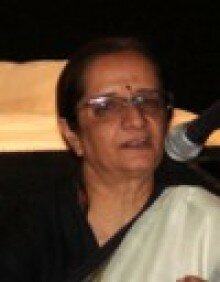
Saroop Dhruv is a Gujarati poet, playwright and cultural activist, based in Ahmedabad. Dedicated to the cause of “women, minorities, Dalits and tribals”, she has worked over the years as a lecturer, essayist, language teacher and freelance writer for the audio-visual media. She has four collections of poetry to her credit. Her poetry has been translated into various languages, including Hindi, Punjabi and English, and featured in anthologies of modernist, feminist and politically engaged literature in Gujarati and English.
She began writing poetry in a more sustained fashion around 1971 when she received a scholarship to work on her doctorate in Gujarati folk literature. Her work was influenced by a family background that had exposed her to a rich variety of literatures: from Sanskrit, medieval and folk Gujarati to modern English and American. She was also influenced by the poetry of eminent modern Gujarati writers, such as Sitanshu Yashashchandra and Labhshanker Thaker.
“I began to feel that this was going to be my vocation,” she says. “Literature is my home – that’s where I get my sense of identity from.” She was associated with a group of Gujarati modernist poets (known as the Hotel Poets Group), spearheaded by Chinu Modi, for several years. Her first book of poems, Mera Hathni Vat (1982), which won an award from the Gujarati Sahitya Parishad, was published during this phase.
Later Dhruv moved away from the group and from what she terms the “obscure, subjective” tenor of her first book. She grew increasingly involved with non-government agencies and Jesuit groups working with Dalit, Adivasi and underprivileged Muslim sections of society in Gujarat. This heightened her awareness of the ways in which gender, caste and class mould language. While she was previously sceptical of the notion of a “woman’s sensibility”, she now began to describe herself as feminist. “As a leftist member of the people’s movement, if I am fighting the battles of the working class, half of them are women, aren’t they?”
Since 1984, she has also been actively engaged in producing issue-based plays and songs for various forums. She is one of the founders of ‘Samvedan Sanskritic Manch’, a cultural group for social change, and ‘Darshan’, a media organisation committed to social change. In 2000, she became one of the founding members of ‘Kalam’, a forum for women writers.
Hastakshep (Intervention), a recent book of poems, is an affirmation that the writer as fearless witness can make a difference. This edition features three of her poems, one of which was written after the communal genocide in Gujarat in 2002.
Dhruv’s intervention is not entirely through the conduit of literature. In the aftermath of the riots, she worked closely with survivors, bringing relief supplies, recording and registering cases and co-authoring a street play, Dilma Chhe Ek Ash (The Heart Remains Hopeful), which was staged in relief camps. “Praxis, committed action, is an urgent necessity,” she maintains. “Without that there is a kind of hollowness in one’s writing.” The aim, she says, is not merely to write about or for the downtrodden, but to write with them. “A committed writer should be actively engaged in working alongside them, empowering them to become creative.”
On an ideological level, Dhruv believes she and fellow-activists still experience isolation. “Still, the conviction that we are on the right path keeps us going . . . At the national level, if not in Gujarat, we have allies.” And so the heart remains hopeful. In an interview with Dr Shirin Kudchedkar (not included here), she declares: “I’ve always been a creature of the environment. But today I feel confident that I can create an environment as well.”
Bibliography
Mara Hathni Vat, Nakshatra Trust, Ahmedabad, 1982.
Salagti Havao, Samvedan Sanskritic Manch, Ahmedabad, 1995.
Hastkshep, Samvedan Sanskritic Manch, Ahmedabad, 2003.
Sahiyara Suraj Ni Khoj Ma, Samvedan Sanskritic Manch, Ahmedabad, 2003.
Links
Muse India: Few poems on 'women and law' from Hasktkshep
Times of India: Article on play written by Saroop Dhruv, ‘Suno Nadi . . . ‘ which was banned by the Gujarat government
Times of India: Saroop Dhruv and her work in ‘Samvedan’ using theatre
Boloji: Several women writers, including Dhruv share their personal experiences of writing under threat, etc.





